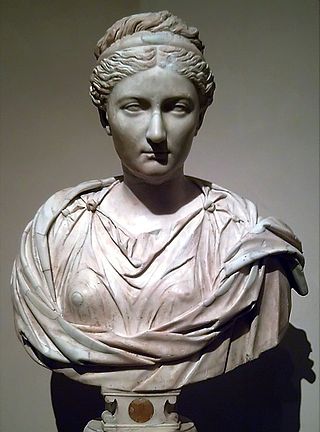Related Research Articles

Lucius Septimius Severus was Roman emperor from 193 to 211. He was born in Leptis Magna in the Roman province of Africa. As a young man he advanced through the customary succession of offices under the reigns of Marcus Aurelius and Commodus. Severus was the final contender to seize power after the death of the emperor Pertinax in 193 during the Year of the Five Emperors.
Lucius Fabius Cilo, full name Lucius Fabius Cilo Septiminus Catinius Acilianus Lepidus Fulcinianus, was a Roman senator, who was a confidant of Septimius Severus. He held a number of appointments that have been dated to the reigns of Commodus and Severus. He was twice Roman consul: the first time in 193 as a suffect, and the second time as ordinary consul in 204 with Marcus Annius Flavius Libo as his colleague. Cilo is known from numerous inscriptions and appears in the Historia Augusta and the history of Dio Cassius. He married Cilonia Fabia.

Gaius or Lucius Fulvius Plautianus was a member of the Roman gens Fulvia. As head of the Praetorian Guard, he was very influential in the administration of state affairs, and clashed with Julia Domna, the wife of Septimius Severus.
Lucius Marius Maximus Perpetuus Aurelianus was a Roman biographer, writing in Latin, who in the early decades of the 3rd century AD wrote a series of biographies of twelve Emperors, imitating and continuing Suetonius. Marius's work is lost, but it was still being read in the late 4th century and was used as a source by writers of that era, notably the author of the Historia Augusta. The nature and reliability of Marius's work, and the extent to which the earlier part of the HA draws upon it, are two vexed questions among the many problems that the HA continues to pose for students of Roman history and literature.
Marcus Caeionius Silvanus was a Roman senator of the second century AD.
Lucius Vipstanus Poplicola Messalla was a Roman Senator.
Lucius Vipstanus Gallus was a Roman senator who is the first documented member of the gens Vipstana. His descendants and relatives include several consuls.
(Gaius) Vipstanus Messalla Gallus was a Roman senator.
Lucius Vipstanus Poplicola Messalla was a patrician senator.
Lucius Valerius Messalla was a Roman senator.
(Lucius Valerius) Messalla was a Roman senator.
Valerius Maximus was a Roman senator.
Claudia Marcella Minor (PIR2 C 1103, born some time before 39 BC) was a niece of the first Roman emperor Augustus. She was the second surviving daughter of the emperor's sister Octavia the Younger and her first husband Gaius Claudius Marcellus. Marcella had many children by several husbands, and through her son Marcus Valerius Messalla Barbatus she became the grandmother of the empress Messalina.

Vibia Aurelia Sabina was the youngest daughter and child born to Roman Emperor Marcus Aurelius and Roman Empress Faustina the Younger. She was a sister to Roman Empress Lucilla and Roman Emperor Commodus. Her maternal grandparents were Roman Emperor Antoninus Pius and Roman Empress Faustina the Elder and her paternal grandparents were Domitia Lucilla and praetor Marcus Annius Verus.
The gens Septimia was a minor plebeian family at ancient Rome. The gens first appears in history towards the close of the Republic, and they did not achieve much importance until the latter half of the second century, when Lucius Septimius Severus obtained the imperial dignity.

Gaius Julius Sohaemus was a Roman client king of Armenia.
Gaius Domitius Dexter was a Roman senator who was appointed consul twice: firstly as suffect consul prior to AD 183, and secondly as ordinary consul in AD 196 with Lucius Valerius Messalla Thrasea Priscus as his colleague.
Lucius Aurelius Commodus Pompeianus was a Roman senator active in the early 3rd century. He was the son of Lucilla, the daughter of Marcus Aurelius, and her second husband Tiberius Claudius Pompeianus, a general active politically during the reigns of Emperors Commodus and Pertinax.

Publius Helvius Pertinax the Younger was a Roman politician, suffect consul of 212 AD and son of Emperor Pertinax. After the latter came to power in 193 AD, the Senate wanted to proclaim Pertinax the Younger as Caesar, but the emperor rejected this proposal. Pertinax the Elder was killed on the 88th day of his reign. His son survived and under Septimius Severus became a flamen of his father's cult, and under Caracalla a suffect consul. He was later executed as a possible contender for Imperial power.
References
- ↑ According to Christian Settipani (Continuité gentilice et continuité sénatoriale dans les familles sénatoriales romaines à l'époque impériale (2000), p. 220), his agnomen was Paetus
- ↑ Birley, Anthony, Septimius Severus: The African Emperor (1999), pg. 159
- ↑ As Ronald Syme has suggested, "Missing Persons III", Historia: Zeitschrift für Alte Geschichte , 11, (1962), p. 155
- ↑ Paul M. M. Leunissen, Konsuln und Konsulare in der Zeit von Commodus bis Severus Alexander (Amsterdam: J.C. Gieben, 1989), p. 133
- ↑ Memmen, p. 123
- ↑ Levick, Barbara Julia Domna, Syrian Empress (2007), p. 90
- ↑ Settipani, Continuité gentilice, p. 220
- ↑ Memmen, p. 125